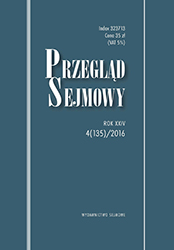Trybunał Konstytucyjny de lege ferenda — propozycje nowelizacji ustawy w odpowiedzi na opinię Komisji Weneckiej
The Constitutional Tribunal de lege ferenda — proposals for amendment of the law in response to the opinion of the Venice Commission
Author(s): Jarosław SzymanekSubject(s): Constitutional Law
Published by: Kancelaria Sejmu
Keywords: Constitutional Tribunal; constitutional judiciary; Venice Commission; extra-parliamentary review of the constitutionality of law; legal-political dispute over the Constitutional Tribunal
Summary/Abstract: The article presents the proposals for the new statutory defi nition of the position of the ConstitutionalTribunal in response to the opinion of the Venice Commission criticizing the so-called “repair law”,adopted in December 2015 to amend the Constitutional Tribunal Act of 25 June 2015. The startingpoint for comments in the article is a critique of the position of Venice Commission which claimsthat there is only one universal and always repeatable model of constitutional judiciary. It is obviouslywrong, as the extra-parliamentary review of the constitutionality of law it is a heterogeneousand strongly pluralistic institution. It may have either a judicial (as in the USA), a quasi-judicial(Austria) or clearly extrajudicial (France) character. Each particular model of constitutional judiciaryis the result of a country’s own experiences, the impact of foreign models of governance and theapproach to constitutional review, which treats it as both an institution and a legal-political idea.It is also worth mentioning that disputes over constitutional courts are by no means Poland’s exclusivedomain, as they took place (to a larger or smaller extent) everywhere, including in the USA,France, Italy, Hungary and South Korea. Later in the article, the author formulates the proposals concerningthe new Constitutional Tribunal Act relating to issues such as the composition of the Tribunal;procedure for the nomination of candidates for judges of the Tribunal; the majority required toelect a judge; procedure for taking oaths from those elected to the post of judge; the adjudicatingpanels and the majority required to take a decision by the Tribunal; as well as the term of offi ce ofthe President of the Constitutional Tribunal. The above-mentioned topics do not exhaust the wholepotential list of issues, but address those matters that have aroused the most controversy and whichbecame the object of scrutiny from the Venice Commission.
Journal: Przegląd Sejmowy
- Issue Year: 2016
- Issue No: 4
- Page Range: 43-64
- Page Count: 22
- Language: Polish

